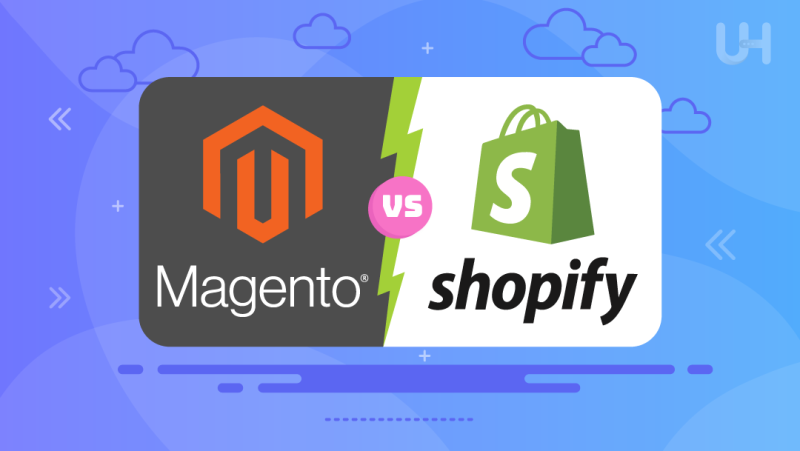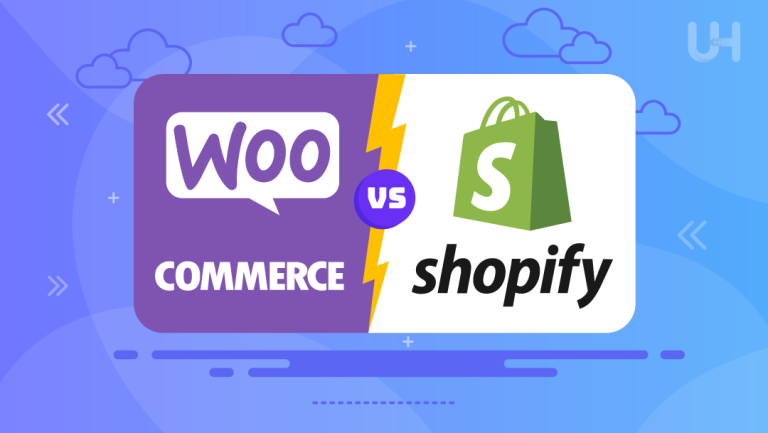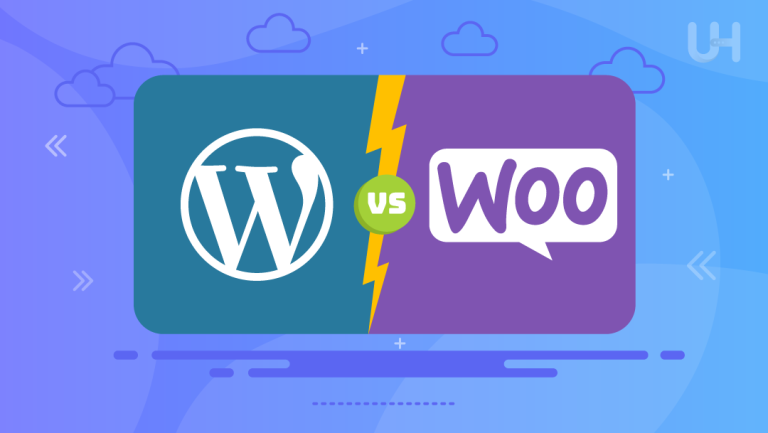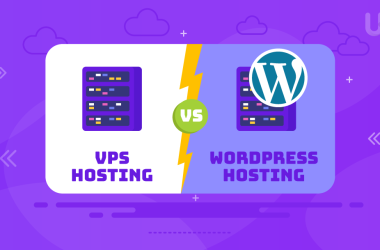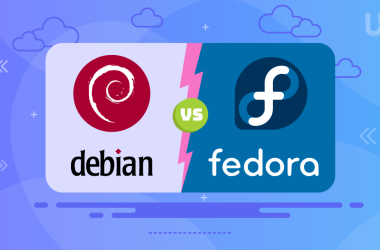As an online store owner, choosing the right eCommerce platform is one of the most critical decisions you will ever take. Magento and Shopify are the two most popular platforms on the market, each with its share of pros and cons. So, in this article, we compare Magento vs Shopify to help you make an informed choice.
Choosing the right eCommerce platform makes it easier to showcase your product line, deliver a superior online shopping experience, and increase revenue. So, let’s compare the fundamental differences between Shopify and Magento, from features and functionality to security and price. Let’s go!
Magento vs Shopify: Overview
Shopify and Magento are two of the most popular eCommerce platforms in 2025. They offer a wide range of features and functionalities to help you set up your online store easily. Shopify comes with its own hosting plan so you don’t need to count on third-party hosting providers. Magento, on the other hand, works well with all the top shared hosting plans. Let’s explore both these platforms in more detail.
What is Shopify?
Shopify is a complete eCommerce platform that lets you build, manage, and expand your online store. The cloud-based platform can be accessed on the go from all devices with an active internet connection. Shopify’s core functionalities include everything you need to set up and run a business. You can use Shopify as a standalone service or integrate the platform with WordPress websites. This means you can optimize your online store using popular WordPress performance plugins.
Key Features
- User-Friendly Interface: Shopify has an intuitive and easy-to-use interface, allowing users to set up and manage their online stores without technical expertise.
- Built-In Payment Gateway: Shopify comes with its own payment gateway, simplifying the payment process.
- Responsive Themes and Templates: Shopify offers a wide range of professionally designed, mobile-responsive themes that can be customized to match your brand’s identity.
Pros
- Shopify is user-friendly with a straightforward setup process, even for beginners
- It handles hosting, security, and maintenance, so you don’t have to worry about technical details
- Shopify has an extensive app store
Cons
- Shopify is more flexible and customizable than Magento
What is Magento?
Magento is an open-source eCommerce platform written in PHP. It offers a wide range of functionalities including a flexible cart system and support for multiple shipping methods, payment gateways, and languages. It is ideal for enterprise users and offers exceptional security and performance. Moreover, Magento integrates with WordPress and is compatible with popular WordPress plugins, such as SEO tools and analytics extensions.
Key Features
- Flexible Shopping Cart: It provides a flexible shopping cart system with support for multiple payment gateways, multiple currencies, and tax rates per location.
- Marketing and SEO Tools: Magento includes built-in SEO tools, promotional pricing, discounts, coupon codes, and cross-selling/upselling features.
- Multi-Store Management: Magento allows businesses to manage multiple online stores from a single dashboard.
Boost Your Business with Magento Hosting
Boost your sales with Ultahost’s Magento Hosting built for performance. Sell with confidence as our Magento Hosting solutions are both secure and scalable.
Pros
- Magento allows you to create a unique online store with extensive customization options
- It can handle large-scale operations, making it ideal for businesses expecting growth
- There’s a large community offering resources, plugins, and support
Cons
Magento has a steep learning curve
Shopify vs Magento: Head-to-Head Comparison
Here is a head-to-head comparison to help you decide whether between Shopify or Magento.
Features
Both Magento and Shopify are easy to use. However, Shopify is simpler to set up than Magento. It also has a vast app store featuring third-party plugins for greater functionality. For example, you can integrate Shopify with Klaviyo, Yotpo, and other third-party tools.
Magento, on the other hand, has more sophisticated and intermediate functions built in. For example, to launch an email campaign, you must install third-party applications such as Remarkety. Overall, Shopify is more feature-packed than Magento.
Payment Gateways
Shopify integrates with over 100 payment gateways. Each third-party gateway has its own pricing structure, offering greater flexibility for users. Unlike Magento, it also integrates with a POS system.
Magento is more expensive than Shopify since it uses third-party payment gateways, which often charge a transaction fee. Therefore, Shopify is more scalable and affordable than Magento.

Usability
While Magento and Shopify have user-friendly UIs, the latter is more suitable for beginners. The interface is pretty straightforward and has a drag-and-drop builder to simplify inventory management.
Magento has a steeper learning curve and requires technical expertise to customize the online store. It is suitable for experienced web developers as it offers more room for personalization.
Web Development
In terms of web development, Shopify and Magento are leagues apart. Magento uses PHP while Shopify uses Liquid, a proprietary open-source template language written in Ruby. While both PHP and Ruby are excellent programming languages, the former is more flexible.
Therefore, Magento can handle a lot more custom coding than Shopify. Hence, it is better suited to creating online stores from scratch. Businesses with access to a professional development team will benefit from Magento, while Shopify is ideal for everybody else.
Security
Both Magento and Shopify are secure platforms and offer a wide range of security measures. They are compatible with secure WP hosting plans and are optimized to keep user data safe, right out of the box.
Shopify uses SSL encryption and two-factor authentication to safeguard data. Magento offers both, then goes a step further to offer fraud protection and PCI compliance as standard.
Content Management Systems
Shopify offers an expansive list of CMS functionalities, allowing users to create, manage, edit, and publish content effortlessly. While it is SEO-friendly and translation-ready, Shopify’s CMS is not suitable for content-rich websites.
On the other hand, Magento has a capable CMS, with an easy-to-use WYSIWYG editor, support for diverse content types, and more. It is scalable and can handle huge product varieties. This makes Magento an ideal choice for building eCommerce stores.
Conclusion
So, if you are confused between Magento vs Shopify, consider your requirements, budget, and experience to make an informed choice. In general, Shopify is more user-friendly while Magento is more customizable. If you are an entrepreneur or own a small online store, Shopify is the better choice. If you want to build an elaborate eCommerce platform, Magento will make more sense.
Looking for a powerful web host for your online store? Choose Ultahost’s managed Dedicated Hosting Plans for flexible deployment options and high-speed servers. Enjoy fast, secure, and reliable hosting, DDoS protection, and 24/7 security, starting at just $84.15/month.
FAQ
Magento vs Shopify: Which is better?
Magento is better for deep customization and scalability, while Shopify excels in ease of use and quick setup.
Is Magento user-friendly?
Magento offers powerful features but has a steep learning curve. It’s not the most user-friendly platform for beginners, requiring technical expertise to manage effectively.
Do people still use Magento in 2025?
Yes, Magento remains a popular choice in 2025, especially for large and growing eCommerce businesses needing extensive customization and scalability.
Magento vs Shopify: Which is beginner-friendly?
Shopify is more beginner-friendly, offering a simple, intuitive interface ideal for those new to eCommerce. Magento, on the other hand, requires more technical know-how.
Does Magento work with Shopify?
Magento and Shopify are separate platforms, so they don’t directly integrate. However, third-party tools can help you migrate data or sync certain functionalities between the two.
Why migrate from Magento to Shopify?
Migrating from Magento to Shopify can simplify store management, reduce maintenance costs, and offer a more user-friendly experience, especially for small to mid-sized businesses.
Why should I use Shopify?
Shopify is ideal for businesses seeking an easy-to-use, all-in-one eCommerce solution. It handles hosting, security, and provides a vast app ecosystem to customize your store effortlessly.





